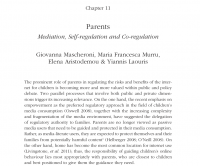Rendering Africa more resilient, sustainable, and better prepared for COVID-analogous pandemics: Proposals from across seven African countries: Difference between revisions
(Created page with "{{Book Chapters |acronym=Parents Mediation, Self-regulation and Co-regulation |logo= Ch7ParentsMedia...") |
No edit summary |
||
| Line 14: | Line 14: | ||
==Abstract== | ==Abstract== | ||
This chapter details a number of proposals for rendering African countries more resilient, sustainable and better prepared for COVID-19 and similar future pandemics. The proposals were solicited from a group of participants from various countries in Africa, who previously (2016) participated in week-long face-to-face dialogues as part of a project entitled “Re-inventing democracy in the digital age” funded by the United Nations Democracy Fund and organized by the Futures Worlds Center. Many of the youth pioneers (aged 18-30) who participated in the 2016 sessions subsequently continued to liaise with one another via various virtual forums. In August 2021, spearheaded by the Future Worlds Center, we decided to set a “triggering question” for these participants to reflect upon and engage around with each | |||
36 | |||
other, with the aim of writing a chapter on responses to COVID-type pandemics, to share with audiences. The triggering question to kindle Ideas/proposals was: “What actions/reforms/ policies should our country take in order to become more resilient, sustainable and better prepared for future crises such as the COVID-19 pandemic?” Volunteer participants were invited to share their Ideas regarding practical and forward-looking (visionary) responses to this question. They were invited in the first instance to share Ideas on a virtual platform called IdeaPrism in preparation for a video conference using Zoom in which clarifications of the Ideas were solicited from the Idea-originators, by others asking questions. The clarification questions were mainly around actual or potential ways of actioning the Ideas within and across countries. This resulted in a rich array of concrete proposals, which we detail in the chapter, along with an overarching synthesis. | |||
==Citation== | |||
* Laouris, Y., Romm, N. R., Abdallah, A., Akomea, B. G. O., Kimbi, M., Mavura, A., ... & Wairimu, R. (2022). Chapter TWO Rendering Africa more resilient, sustainable, and better prepared for COVID-analogous pandemics: Proposals from across seven African countries. In A.L. Fymat, N.R.A. Romm, and J. Kapalanga (Ed.) ''COVID-19 Pandemic: Perspectives across Africa'' (pp. 36-61). Victoria, British Columbia, Canada: Society for the Advancement of Science in Africa.. | |||
[[Category: Book Chapters]] | [[Category: Book Chapters]] | ||
Revision as of 07:20, 21 April 2022
|
Abstract
This chapter details a number of proposals for rendering African countries more resilient, sustainable and better prepared for COVID-19 and similar future pandemics. The proposals were solicited from a group of participants from various countries in Africa, who previously (2016) participated in week-long face-to-face dialogues as part of a project entitled “Re-inventing democracy in the digital age” funded by the United Nations Democracy Fund and organized by the Futures Worlds Center. Many of the youth pioneers (aged 18-30) who participated in the 2016 sessions subsequently continued to liaise with one another via various virtual forums. In August 2021, spearheaded by the Future Worlds Center, we decided to set a “triggering question” for these participants to reflect upon and engage around with each
36
other, with the aim of writing a chapter on responses to COVID-type pandemics, to share with audiences. The triggering question to kindle Ideas/proposals was: “What actions/reforms/ policies should our country take in order to become more resilient, sustainable and better prepared for future crises such as the COVID-19 pandemic?” Volunteer participants were invited to share their Ideas regarding practical and forward-looking (visionary) responses to this question. They were invited in the first instance to share Ideas on a virtual platform called IdeaPrism in preparation for a video conference using Zoom in which clarifications of the Ideas were solicited from the Idea-originators, by others asking questions. The clarification questions were mainly around actual or potential ways of actioning the Ideas within and across countries. This resulted in a rich array of concrete proposals, which we detail in the chapter, along with an overarching synthesis.
Citation
- Laouris, Y., Romm, N. R., Abdallah, A., Akomea, B. G. O., Kimbi, M., Mavura, A., ... & Wairimu, R. (2022). Chapter TWO Rendering Africa more resilient, sustainable, and better prepared for COVID-analogous pandemics: Proposals from across seven African countries. In A.L. Fymat, N.R.A. Romm, and J. Kapalanga (Ed.) COVID-19 Pandemic: Perspectives across Africa (pp. 36-61). Victoria, British Columbia, Canada: Society for the Advancement of Science in Africa..
